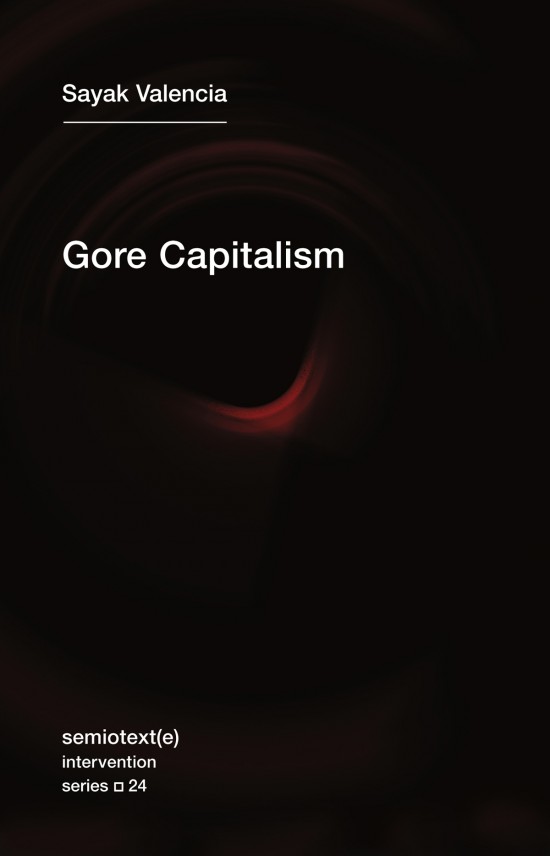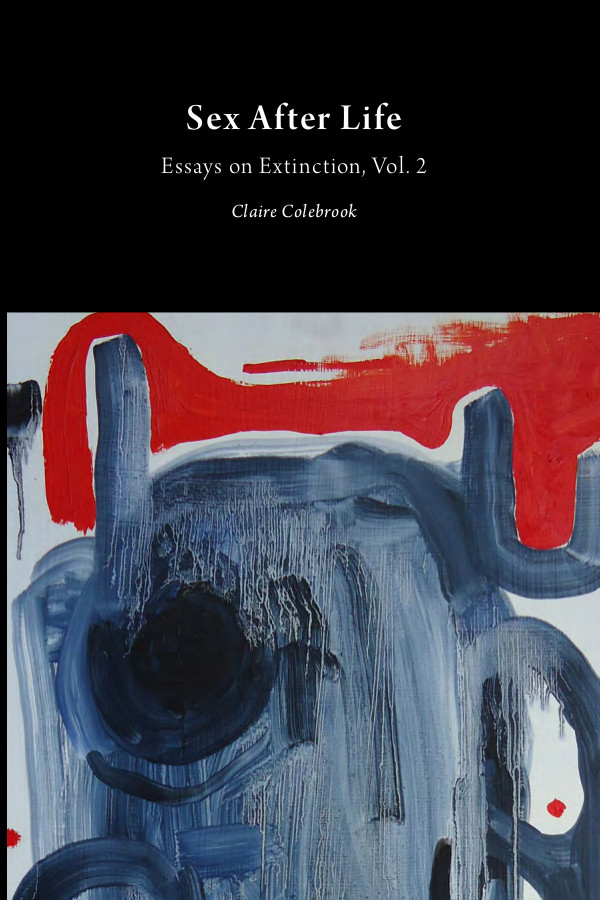Sayak Valencia: Gore Capitalism (2010–) [ES, EN]
Filed under book | Tags: · capitalism, death, feminism, necropolitics, neoliberalism, politics, violence

“Death has become the most profitable business in existence.”—from Gore Capitalism
“Written by the Tijuana activist intellectual Sayak Valencia, Gore Capitalism is a crucial essay that posits a decolonial, feminist philosophical approach to the outbreak of violence in Mexico and, more broadly, across the global regions of the Third World. Valencia argues that violence itself has become a product within hyper-consumerist neoliberal capitalism, and that tortured and mutilated bodies have become commodities to be traded and utilized for profit in an age of impunity and governmental austerity.
In a lucid and transgressive voice, Valencia unravels the workings of the politics of death in the context of contemporary networks of hyper-consumption, the ups and downs of capital markets, drug trafficking, narcopower, and the impunity of the neoliberal state. She looks at the global rise of authoritarian governments, the erosion of civil society, the increasing violence against women, the deterioration of human rights, and the transformation of certain cities and regions into depopulated, ghostly settings for war. She offers a trenchant critique of masculinity and gender constructions in Mexico, linking their misogynist force to the booming trade in violence.
This book is essential reading for anyone seeking to analyze the new landscapes of war. It provides novel categories that allow us to deconstruct what is happening, while proposing vital epistemological tools developed in the convulsive Third World border space of Tijuana.”
Publisher Melusina, Barcelona, 2010
ISBN 8496614875, 9788496614871
240 pages
English edition
Translated by John Pluecker
Publisher Semiotext(e), South Pasadena, CA, 2018
Intervention series
ISBN 9781635900125, 1635900123
330 pages
Reviews: Gabriela Wiener (El País, 2010, ES), Elisa G. McCausland (Profesiones, 2010, ES), Elena Cabrera (DT, 2011, ES), Sergio Gonzalez Rodriguez (Reforma, 2011, ES), Hilda Mariela Barbosa Suarez (Tribuna de Querétaro, 2011, ES), Ignacio Sánchez Prado (ARTMargins, 2018), Richard Marshall (3:AM Magazine, 2018), Rose Deller (LSE Review of Books, 2018), Abeyamí Ortega (Social Text, 2019), Anastasia Baginski (Chasquí, 2019).
Publisher (ES)
Distributor (EN)
Translator (EN)
WorldCat (EN)
Capitalismo gore (Spanish, 2010)
Gore Capitalism (English, 2018)
Georges Bataille: Blue of Noon (1957–) [FR, EN, ES]
Filed under fiction | Tags: · death, eroticism, fascism, politics, sex, surrealism

“Set against the backdrop of Europe’s slide into fascism, this twentieth-century erotic classic takes the reader on a dark journey through the psyche of the pre-war French intelligentsia, torn between identification with the victims of history and the glamour of its victors. One of Bataille’s overtly political works, it explores the ambiguity of sex as a subversive force, bringing violence, power and death together in a terrifying unity. Written in 1935.”
Publisher Pauvert, Paris, 1957
215 pages
English edition
Translated by Harry Matthews
Publisher Marion Boyars, London, 1979
This edition Paladin Books, 1988
ISBN 0586086242
155 pages
Review: Kirkus (1979).
Commentary: David Fieni (2003).
Le bleu du ciel (French, 1957/1971)
Blue of Noon (English, trans. Harry Matthews, 1979, HTML, PDF)
El azul del cielo (Spanish, n.d.)
Claire Colebrook: Essays on Extinction, 2 vols.: Death of the PostHuman & Sex After Life (2014)
Filed under book | Tags: · aesthetics, anthropocene, autopoiesis, critical theory, death, ecology, feminism, life, philosophy, posthuman, posthumanism, queer theory, sex, vitalism


“Death of the PostHuman undertakes a series of critical encounters with the legacy of what had come to be known as ‘theory,’ and its contemporary supposedly post-human aftermath. There can be no redemptive post-human future in which the myopia and anthropocentrism of the species finds an exit and manages to emerge with ecology and life. At the same time, what has come to be known as the human–despite its normative intensity–can provide neither foundation nor critical lever in the Anthropocene epoch. Death of the PostHuman argues for a twenty-first century deconstruction of ecological and seemingly post-human futures.”
“Sex After Life aims to consider the various ways in which the concept of life has provided normative and moralizing ballast for queer, feminist and critical theories. Arguing against a notion of the queer as counter-normative, Sex After Life appeals to the concept of life as a philosophical problem. Life is neither a material ground nor a generative principle, but can nevertheless offer itself for new forms of problem formation that exceed the all too human logics of survival.”
Publisher Open Humanities Press, 2014
Critical Climate Change series
Creative Commons BY-SA 3.0 License
ISBN 978-1-60785-299-5 (v1), 978-1-60785-300-8 (v2)
243 & 263 pages
Vol. 1: HTML, PDF, PDF, PDF
Vol. 2: HTML, PDF, PDF, PDF

